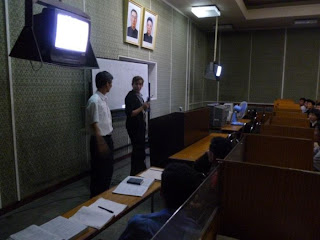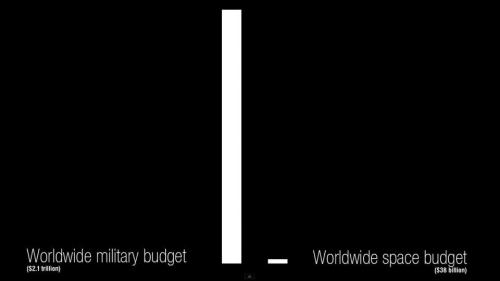Bolivarescobar
Shared posts
The New Movie That Is Clearly a 'Men in Black' Rip-Off
House passes controversial “cybersecurity” bill CISPA in 288-127 vote | Ars Technica
Bolivarescobar>:(
The United States House of Representatives approved the Cyber Intelligence Sharing and Protection Act (CISPA) [Thursday] by a comfortable 288 to 127 margin. Almost half of the House’s Democrats joined 196 Republicans in supporting the measure.
The legislation grants companies broad legal immunity when they share information related to online threats with one another and with the federal government. Advocates argue that the legislation is needed to allow companies to quickly and efficiently share information in order to help secure their networks.
But critics such as the American Civil Liberties Union and the Electronic Frontier Foundation describe the legislation as an attack on user privacy. They worry that companies will use the broad immunity offered by CISPA to ignore other laws that protect consumer privacy. And in a veto threat issued on Tuesday, the White House echoed these arguments.
“The bill does not require private entities to take reasonable steps to remove irrelevant personal information when sending cybersecurity data to the government or other private sector entities,” the Obama administration said on Tuesday.
“The US House just passed CISPA, undermining the privacy of millions of Internet users,” the Electronic Frontier Foundation said in a tweet. “Now we take this fight to the Senate.”
“I voted against #CISPA because it does not adequately protect the civil liberties of Americans,” Rep. Anna G. Eshoo (D-CA) tweeted. “People deserve both privacy and security.”
So far, the CISPA debate has been a repeat of last year’s legislative process. An earlier version of CISPA passed the House in 2012 despite the objection of civil liberties groups, but companion legislation got bogged down in the Senate.
pleatedjeans: “My friend who is a gardener sends me photos of...
Journey into North Korea

































































































Via Reddit
Prova de Filosofia da Arte


Imagens meramente ilustrativas. Não fazem parte da prova. Não contém glúten.
1ª Questão
Visite os dois links abaixo e responda:
a) Qual dos dois artigos apresenta arte e qual dos dois apresenta técnica?
b) É necessário o domínio da técnica para se produzir uma obra de arte? Comente.
c) Tomando como base o que foi observado nos dois links, desenvolva uma definição de arte que justifique as respostas dadas aos itens a e b.
I) http://migre.me/2NEhj
II) http://migre.me/2NEln
Utilize os comentários desse post para sua resposta.
doctordonna10: castielsunderpants: mattykeehl: gallifrey-feels...


wholocked-me-in-my-mindpalace:
Hitler flirting with Eva Braun.
I don’t know how this makes me feel
It makes me feel very uncomfortable
You know what’s so uncomfortable about this? It shows that perhaps one of the most evil men in history, was a human being. That, on occasion, he could be nice, even flirty. That’s not all. You want to see evil people as evil, screaming horrible stuff over a desk with 20 microphones with 20, 000 people saluting them. The evil is clear and recognizable then. This shows a completely different image, it scares you because that means that evil isn’t a stereotype, that evil is not recognizable, that evil could be anyone. It scares you because this shows that could be lurking inside anyone and you’ll never ever know. Maybe in you?
i reblogged this literally like 2 minutes ago, but i want this version because of that comment ^
That comment is one of my favorite post commentaries, because it’s completely right. People aren’t inherently evil. Like good, it’s a role they grow and live into. We have just as much potential to destroy as this man exhibited. And it’s a very eye opening experience to realize that.
does anyone even remember that one time hitler attended that luncheon between world leaders, some guests of which even included china’s socialist leader as well as Stalin. And then when they were ordering, everyone was gladly ordering impressive dishes one after the other, but Hitler placed an order for barley tea and a pheasant (considered a peasant’s meal by standard). When he was questioned as to why he would order something like this in something as grand as a world leader’s congress, he replied,
“I don’t smoke when my people cannot smoke, and I cannot eat when my people are going hungry.”
He wasn’t evil for its own sake, let’s try to remember that despite the countless murders, but for a moment, he did actually believe he was doing something for the good of his countrymen.
WHAT IS WRONG WITH YOU PEOPLE
No, he’s right. Hitler, though extremely wrong in his views, did everything for what he thought would better the lives of his people. It was wrong. It was disgustingly, horribly wrong. But he did not do it because it was evil and he was evil. He did it because he believed it would help Germany and those who needed a better life. Those who don’t understand or even try to understand the human brain will always label men like him as ‘evil’ because it is easier to accept. But he wasn’t ‘evil.’ He felt love and loyalty and responsibilities. He simply took these aspects and morphed them into a twisted, violent thing.
Tumblr is probably the only place we could have this conversation and not be lynched.
oh my god reblogging if only for the last comment
this is literally the best thing on tumblr
neurosciencestuff: Brain Games are Bogus A decade ago, a young...

Brain Games are Bogus
A decade ago, a young Swedish researcher named Torkel Klingberg made a spectacular discovery. He gave a group of children computer games designed to boost their memory, and, after weeks of play, the kids showed improvements not only in memory but in overall intellectual ability. Spending hours memorizing strings of digits and patterns of circles on a four-by-four grid had made the children smarter. The finding countered decades of psychological research that suggested training in one area (e.g., recalling numbers) could not bring benefits in other, unrelated areas (e.g., reasoning). The Klingberg experiment also hinted that intelligence, which psychologists considered essentially fixed, might be more mutable: that it was less like eye color and more like a muscle.
It seemed like a breakthrough, offering new approaches to education and help for people with A.D.H.D., traumatic brain injuries, and other ailments. In the years since, other, similar experiments yielded positive results, and Klingberg helped found a company, Cogmed, to commercialize the software globally. (Pearson, the British publishing juggernaut, purchased it in 2010.) Brain training has become a multi-million-dollar business, with companies like Lumosity, Jungle Memory, and CogniFit offering their own versions of neuroscience-you-can-use, and providing ambitious parents with new assignments for overworked but otherwise healthy children. The brain-training concept has made Klingberg a star, and he now enjoys a seat on an assembly that helps select the winners of the Nobel Prize in Physiology or Medicine. The field has become a staple of popular writing. Last year, the New York Times Magazine published a glowing profile of the young guns of brain training called “CAN YOU MAKE YOURSELF SMARTER?”
The answer, however, now appears to be a pretty firm no—at least, not through brain training. A pair of scientists in Europe recently gathered all of the best research—twenty-three investigations of memory training by teams around the world—and employed a standard statistical technique (called meta-analysis) to settle this controversial issue. The conclusion: the games may yield improvements in the narrow task being trained, but this does not transfer to broader skills like the ability to read or do arithmetic, or to other measures of intelligence. Playing the games makes you better at the games, in other words, but not at anything anyone might care about in real life.
I took some quotations from people I like and illustrated them
BolivarescobarVonnegut
What’s The Deal With Seinfunk?![via]
BolivarescobarPorra eu quero comrpar esse álbum
30 Minimal Logo Designs for your Inspiration
Your logo is your face. It is how you present your brand to your audience. It is how you want people to see you. Designing the right logo is a very tricky process, especially because you want to visually impress your audience without overwhelming them. You want to get their attention for the right reasons. This is why I love minimal logos. Following the trend of minimalism in web design, minimal logos can also be very inspiring. So today we gathered a collection of inspiring minimalistic logos to show you. Here you will be able to see that a lot of times the simple path can deliver amazing results.
An ampersand (or epershand; “&”) is a logogram representing the conjunction word “and” — this symbol is a ligature of the letters et, Latin for “and”













































































 Go to the 300&65 Ampersands project
Folkert
Go to the 300&65 Ampersands project
Folkert
...the moon gazed on my midnight labours, while, with unrelaxed and breathless eagerness, I pursued nature to her hiding-places


 Atley
Atley
diversas vezes já passei por esse momento
BolivarescobarHAHAHA

diversas vezes já passei por esse momento
heythereuniverse: CONTINUUM | Planetary Collective CONTINUUM is...
CONTINUUM | Planetary Collective
CONTINUUM is a feature length documentary telling the story of where we came from, who we are, and the possibilities of our future. The film features interviews with poets and astronauts, physicists and storytellers, anthropologists and Tibetan lamas, and stunning cinematography from around the world. The many voices of the film share a unified vision: we must start acting as a planetary civilization.
I’m creating footage for this film, and it’s definitely worth investing in.
we-are-star-stuff: This seems relevant today.
Bolivarescobar>:(
The Plan Backfired
BolivarescobarO feitiço se voltou contra o feiticeiro??
"Haha! I've got you now you- OH GOD HALP I NEVER ASKED FOR THIS!"
Submitted by: Unknown (via NikNak's Blog)
Tagged: dogs , pets , laundry hamper , g rated , Parenting FAILS Share on Facebooktypette: sigfodr: A version for tumblr that can be read...
that-one-canoe: “Nevertheless, the fact is that there is...





“Nevertheless, the fact is that there is nothing as dreamy and poetic, nothing as radical, subversive, and psychedelic, as mathematics. It is every bit as mind blowing as cosmology or physics… and allows more freedom of expression than poetry, art, or music… Mathematics is the purest of the arts, as well as the most misunderstood.” - Paul Lockhart
Crítica da Cultura
BolivarescobarO Ex-Papa manjava muito. Por que então a renúncia?
BERNARD LAURET
| Durante sua visita à França, em 2008, Bento XVI fez questão de dirigir-se diretamente ao “mundo da cultura”. Foi no colégio dos Bernardinos, uma abadia fundada no século 13 pelos monges Cistercienses que, assim como os Franciscanos e os Dominicanos, queriam fazer-se presentes na Universidade de Paris, “forno onde se assa o pão intelectual do mundo latino”, como dizia o papa Inocente IV. O colégio dos Bernardinos formou clérigos durante séculos, antes de ser confiscado (“secularizado”) pela Revolução Francesa, em 1790. Em 2001, foi comprado novamente pela diocese de Paris e transformado em centro cultural. O local não podia ser mais bem escolhido para significar a contribuição histórica do cristianismo à cultura, mas também seus limites, quer dizer, sua “exculturação” em um contexto secularizado. Bento XVI fez questão de mostrar, logo de saída, que foram basicamente a busca de Deus e o estudo de sua Palavra que conduziram os monges a desenvolver uma cultura que transformou a Europa. Foi nesse intuito que eles transmitiram a cultura antiga e fundaram escolas e bibliotecas, acolhendo autores cristãos e não-cristãos. Essa cultura intelectual e espiritual era igualmente inseparável do trabalho manual – lavrar as terras e lavrar os textos. Assim, a cultura não pode ser compreendida como uma simples realidade intelectual ou estética, mas sobretudo como uma civilização (Kultur, em alemão). |
Mas isso se deu antes da época do Iluminismo (Aufklärung, Enlightenment, Lumières), que capitaneou a emancipação da razão chegada à idade adulta e liberada de toda autoridade que pretendesse manter a Humanidade sob tutela. Daí Bento XVI concluir seu discurso evocando o silêncio de Deus em nossa época. Mas o fez para chamar seus contemporâneos à busca de Deus, conforme o exemplo dos medievais, a fim de que a cultura não seja reduzida apenas às possibilidades do que o ser humano pode fazer ou imaginar. É por isso que Bento XVI não cessa jamais de sublinhar a complementaridade entre razão e fé: a fé sem a razão conduz ao fundamentalismo; a razão sem a fé expõe o ser humano aos fantasmas da onipotência sem limites.
A política ou os perigos de uma deriva cultural
Em 2005, em Subiaco (comuna italiana onde foi fundada a primeira abadia beneditina), ao receber o Prêmio São Bento pela promoção da cultura (no mesmo momento em que os Estados europeus recusavam-se a introduzir na Constituição qualquer referência a Deus e às “raízes cristãs”), Ratzinger fez um discurso delineando o quadro sombrio das ameaças que pesam sobre o mundo de hoje, quando o homem, dotado de um grande poder técnico, parece não “dispor de uma energia moral correspondente”: armas nucleares e biológicas, clonagem, terrorismo, desigualdade na repartição de bens, “choque das culturas”. Ele levanta, pois, a questão dos limites da racionalidade técnica e positivista.
No entanto, Ratzinger não condena os ganhos do Iluminismo no que concerne à liberdade de consciência, à “coexistência de diferentes culturas religiosas” e à separação entre Estado secular (laico) e religião. Ele mesmo reivindica, não sem razão, que esses ganhos têm raízes no cristianismo. Em revanche, recusa que somente os critérios da razão iluminista sejam capazes de julgar a legitimidade das tradições religiosas; evoca precisamente as questões referentes ao aborto, à homossexualidade e à ordenação das mulheres. Recusa “que Deus seja tirado definitivamente da vida pública”, e, por isso, encoraja o cristianismo a encarar o desafio de levantar-se e falar, pois o considera como uma religião da razão, fundada sobre o Lógos criador. Tomando, aliás, o antípoda da máxima de Hugo Grotius (1583-1645) – que queria estabelecer o direito das nações sem recorrer a Deus –, Ratzinger propõe viver a vida tomando Deus como hipótese, para que a razão permaneça aberta a ele. Ele vai além da aposta de Blaise Pascal (1623-1662), que, diante da incerteza, preferia crer em Deus: depois da morte, se ele existir, ganhamos tudo; se não existir, não perdemos nada. Ratzinger vai de fato além e refere-se explicitamente a Immanuel Kant (1724-1804), que havia negado a possibilidade de conhecer Deus segundo a razão pura, mas o postulava no agir moral.
Nesse quadro político, todavia, Ratzinger afirma mais os direitos da religião e seu dever de racionalidade, sem fundamentar os limites respectivos da razão e da fé no contexto da Modernidade. Mas o encontro com Jürgen Habermas (1929-) permite uma abordagem explícita dessa questão.
A difícil partilha entre razão e fé na cultura
Um diálogo direto e insólito foi organizado em 2004, em Munique, entre o então cardeal Joseph Ratzinger e o pensador Jürgen Habermas. Seria de esperar que Habermas, principal herdeiro da “teoria crítica” da primeira Escola de Frankfurt, partilhasse o pessimismo dos fundadores – Max Horkheimer (1895-1973) e Theodor Adorno (1903-1969) – no que toca à cultura e ao que Bento XVI chamará de consequências do desmembramento da razão: o pensamento reificado e instrumentalizador; o pensamento científico que deixa de lado a moral e a estética; a cultura de massas, contrária à emancipação dos indivíduos etc. Ora, Habermas não partilha esse pessimismo. Atento como seus predecessores às ciências humanas, ele vê na diversidade das disciplinas a condição mesma de uma razão competente porque limitada. Entre o sujeito que pensa e a realidade objetiva, há a linguagem – que não é assimilada ao Lógos antigo – e a comunicação. Os meios de comunicação de massa situam-se assim no coração desse processo em que a cultura pode ou ser manipulada pelo dinheiro e pelos poderes ou fazer valer o mundo vivido e a razão emancipadora. A Teoria do agir comunicativo elabora assim as condições de uma ética de comunicação sem dominação externa abusiva. Em que medida seria então possível dar lugar às tradições religiosas, apoiadas sobre uma revelação superior à razão? É o que esclarece o diálogo com Ratzinger. Aparentemente, os dois protagonistas partilham as mesmas convicções sobre um respeito mútuo das competências. Mas eles diferem sobre os fundamentos dessa “autolimitação”. Com efeito, ambos buscavam responder à questão posta pelos organizadores do debate: “o Estado democrático e secularizado nutre-se de pressupostos normativos que ele mesmo é incapaz de garantir?”.
A resposta de Habermas é “não”, e em nome da razão. Mas ele não rejeita por isso a contribuição das religiões ao debate no espaço público. Para ele, a autolimitação da razão não vem de sua incompetência sobre as questões de fundo abordadas também pela religião, mas, ao contrário, da compreensão moderna de sua competência: uma razão não pode ter pretensão de validade a menos que aceite as diversas disciplinas (em particular as ciências humanas) que exercem sua competência em um campo definido e limitado. É justamente porque ela se sabe limitada e falível que a razão pode abrir-se a uma alteridade. “Sem haver intenção teológica no ponto de partida, uma razão que interiorize seus limites vai além de si mesma sobre caminhos rumo a algo de outro que ela mesma”. Essa autolimitação da razão moderna supõe, por outro lado, que as proposições de tipo religioso sejam expressas em uma linguagem argumentada diante da razão e no espaço público.
O raciocínio de Ratzinger segue outro caminho. Partindo da violência infligida à sociedade pelas “patologias” da religião (os fundamentalismos) e pelos excessos da razão técnica (o terrorismo), ele estima que “a razão também deve ser lembrada de seus limites e aprender uma capacidade de escuta com relação às grandes tradições religiosas da Humanidade”. A razão é limitada, aqui, do exterior e não do interior. Ratzinger aceita, pois, uma forma de racionalidade universal, sem referência a uma fé em particular, mas que estaria em correlação com uma dimensão religiosa que se encontra em todas as culturas (a interculturalidade).
Ambos, portanto, abrem caminhos novos de reflexão e ação.
Uma nova abordagem
Foi em seu discurso aos bispos da Ásia, em Hong Kong, 1993, que Ratzinger desenvolveu essa ideia de interculturalidade oposta por ele à noção de “inculturação da fé” em voga depois do Concílio Vaticano II. Segundo sua análise, não existe fé pura, independentemente de uma cultura, e vice-versa. A missão cristã não tem por objetivo transplantar o cristianismo ocidental (fé e cultura mescladas) em outras culturas cuja dimensão religiosa seria ignorada. Essa abordagem das culturas por suas relações mútuas necessárias e o respeito das diversas tradições religiosas relativiza, de um só golpe, o cristianismo sob sua forma ocidental, e eleva ao mesmo tempo a figura de Cristo, Lógos semeado por toda parte. Deixa ao mesmo tempo o desejo de que haja outra coisa do que um choque de culturas e religiões.
Habermas distinguia três abordagens diferentes da validação da verdade (abandonando assim o “credo metafísico” de uma linguagem dominada pela unidade em detrimento da multiplicidade): a relação ao mundo objetivo (a verdade tradicional), as relações entre sujeitos na interatividade (a justeza normativa) e a sinceridade (autenticidade) no discurso de cada um. Essa diferenciação reencontra aquela enfatizada por Ratzinger e que o cristianismo introduz em seu discurso sobre o domínio da criação (relação ao mundo confiado ao ser humano com todas as suas fontes – seculares – da ciência e das técnicas), da revelação (interatividade entre sujeitos e culturas) e da redenção ou salvação (que supõe que o ser humano, falível, encontre a autenticidade pela conversão e o perdão). No entanto, a prática dos Estados e das religiões desafia o pessimismo de um e o otimismo do outro.
Tradução de Juvenal Savian Filho
Bernard Lauret
é filósofo e teólogo, doutor pela Universidade de Munique,
ex-diretor literário das Éditions du Cerf (Paris)
Clever Girl
Bolivarescobarhahaha
Ah yes, a true Jurassic Prank! I’m guessing this will be the plot of the recently announced Jurassic Park 4 as well. Either way, here’s this classic scene from the original movie.
Also, there’s FREE worldwide shipping over at Society6 yet again, thru March 17th! Use this link: http://society6.com/optipess?promo=0938f9. As always, just let me know if you want to see a particular Optipess comic up for purchase there.






















































